Opinion: Supreme Court drops the H-bomb and D-bomb
- Oops!Something went wrong.Please try again later.
Editor’s Note: Sign up to get this weekly column as a newsletter. We’re looking back at the strongest, smartest opinion takes of the week from CNN and other outlets.
The choice faces every one of Harvard University’s 25,000 students and more than 400,000 alumni: say in casual conversation that your university was a “school near Boston” or insert the fact that you are, or were, at the nation’s oldest and most prestigious institution of higher education — and risk appearing that you are boasting.
Asked last year what advice he would give to a senior, Harvard College Dean Rakesh Khurana told the student newspaper, The Crimson, “Don’t gratuitously drop the H-bomb.”
As the Wall Street Journal noted, “The H-bomb … is the thermonuclear act of saying aloud that one attends or attended Harvard.”
Attending Harvard isn’t just a matter of pride. It has real-world consequences. Graduates of Harvard and other Ivy League schools earn significantly more than most college graduates –— the credential opens doors. Maybe the best confirmation of that is that eight out of the nine Supreme Court justices went to law school at either Harvard or its Ivy rival, Yale.
For some, those doors will be shut after the conservative majority on the Supreme Court killed the use of affirmative action in college admissions Thursday, ruling that the consideration of race by Harvard and the University of North Carolina — and by extension, any college other than the military academies — is a violation of the Fourteenth Amendment’s equal protection clause.
Like last year’s ruling on abortion, the decision was not a surprise. As Michael Gerhardt, a law professor at the University of North Carolina, noted, “For nearly five decades, affirmative action in university admissions has been as much of a target as Roe v. Wade was” among the conservative legal establishment. “Just as (former President Donald) Trump took credit for the overruling of Roe, he can take credit for the three appointments that helped guarantee the end of affirmative action in higher education.”
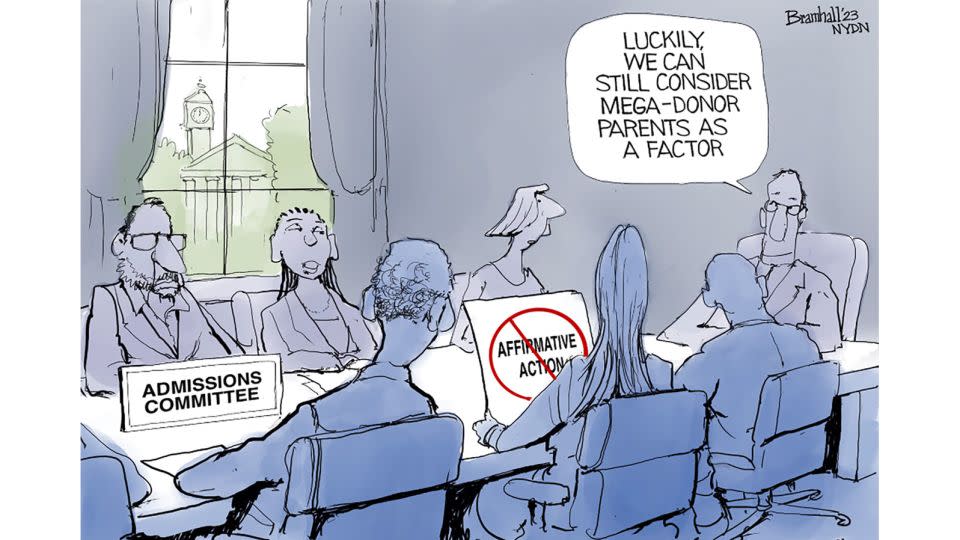
Summer Tan, a rising sophomore at Harvard, wrote, “This ruling will affect generations to come, keeping many students from gaining access to the academic spaces that I have benefitted from. … the Supreme Court has jeopardized the intellectual and academic diversity that my peers, professors and I value: The very same diversity that has made this nation great.”
Ana Fernandez, a recent graduate of Wellesley College, argued that there are serious flaws in the way affirmative action is being used. “At many elite colleges, minority student representation is skewed toward students from privileged socio-economic backgrounds regardless of their racial or ethnic identities. According to researcher and author Richard Kahlenberg, 71% of Black, Latino and Native American students at Harvard … come from college-educated homes with incomes above the national median. In fact, they hail from the most advantaged fifth of families in their respective racial or ethnic groups. Are these the students who truly need a leg up in admissions?”
In 2003, the court upheld the use of affirmative action in admissions but said the practice would no longer be needed in 25 years. The court’s decision moves up that clock by five years, as Lanhee Chen wrote. “The court’s decision Thursday is consistent with its view that race-based preferences should and would have a limited shelf life. And, as the decision notes, the significant majority of America’s colleges and universities do not use race as a factor in admissions, while three of the country’s most populous states (including California) have already outlawed it. While it may be tempting to argue that today’s ruling constitutes a significant deviation from existing precedent, and will usher in a sea change in how college admissions are conducted, the reality is very different.”
The new decision, Peniel E. Joseph observed, “represents an enormous setback to efforts to create greater opportunity in a country riven by White racial privilege, class distinctions and outright hostility towards Blacks and other historically marginalized and underrepresented groups.”
The debt bomb
The court followed up its momentous ruling on affirmative action Thursday with another sweeping decision on Friday. It threw out President Joe Biden’s student loan forgiveness plan, which would have relieved all of the remaining debt owed by 20 million people and reduced the median amount owed by another 23 million from $29,400 to $13,600.
This feels personal for Rachel Clark, a former schoolteacher whose $23,000 in debt would have been cut to $3,000 under Biden’s plan. “I am one of a growing number of teachers who has left the field because they’re unable to make ends meet. … At 32, I can no longer live hand to mouth. I have no assets that can set me up for a future of motherhood, home ownership or retirement. I have nothing except debt. And the Supreme Court has just guaranteed that this will be the case for many years to come.”
“The court made the right decision,” wrote Ilya Somin, a law professor at George Mason University. “If the administration had won, Biden and future presidents would have been empowered to use vague statements to usurp Congress’ constitutional control over the federal budget. Moreover, because of the context for this decision, it also would have allowed the president to abuse emergency powers for partisan ends.”
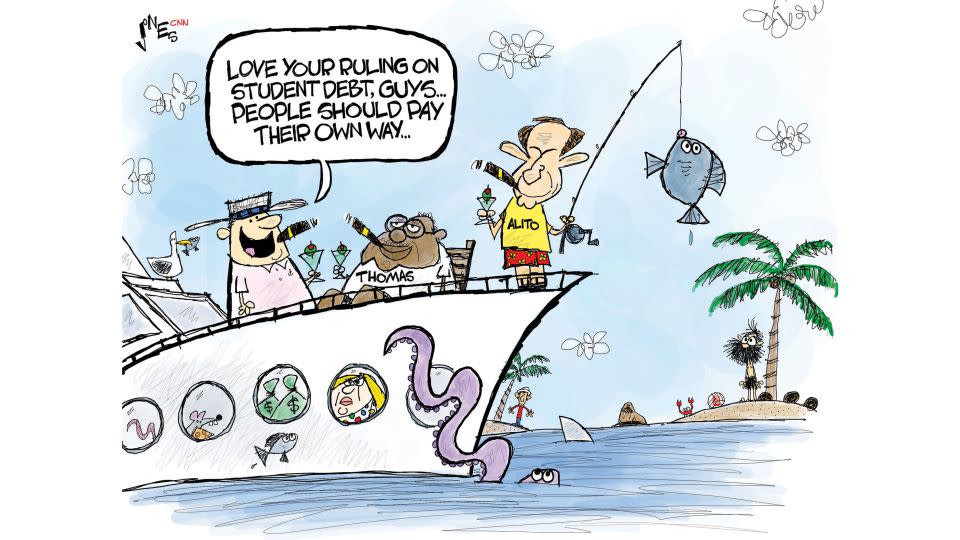
The write-off of $430 billion in loans “would have been a waste of taxpayer funds when the US is already facing a looming fiscal crisis, a regressive policy in that it helps the relatively affluent (former college students) and potentially inflationary by infusing vast amounts of additional cash into the economy,” Somin added.
To Leah Litman, a law professor at the University of Michigan, the court’s decision was a huge overreach — “the latest decision that shows the conservative majority of the Supreme Court is deploying whatever tool it can come up with to invalidate what it considers bad policy.” Democratic government isn’t designed to work this way, she observed. “The unelected justices aren’t supposed to veto policies they don’t like just because the policies strike the justices as unwise.”
For more on the court:
Timothy Holbrook: The Supreme Court leaves door open to widespread discrimination
Nicole Hemmer: Another not-as-bad-as-it-could-be decision from America’s highest court
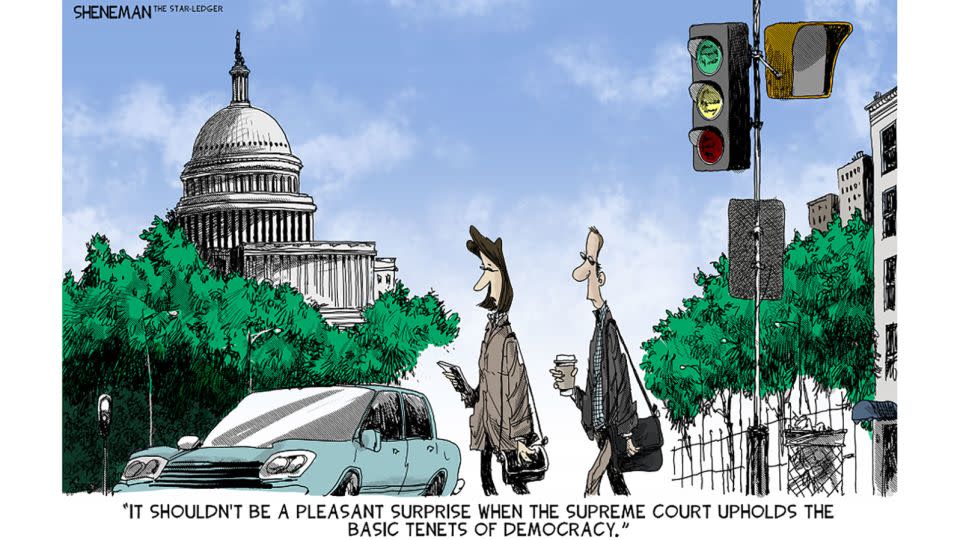
Smoke drifts back
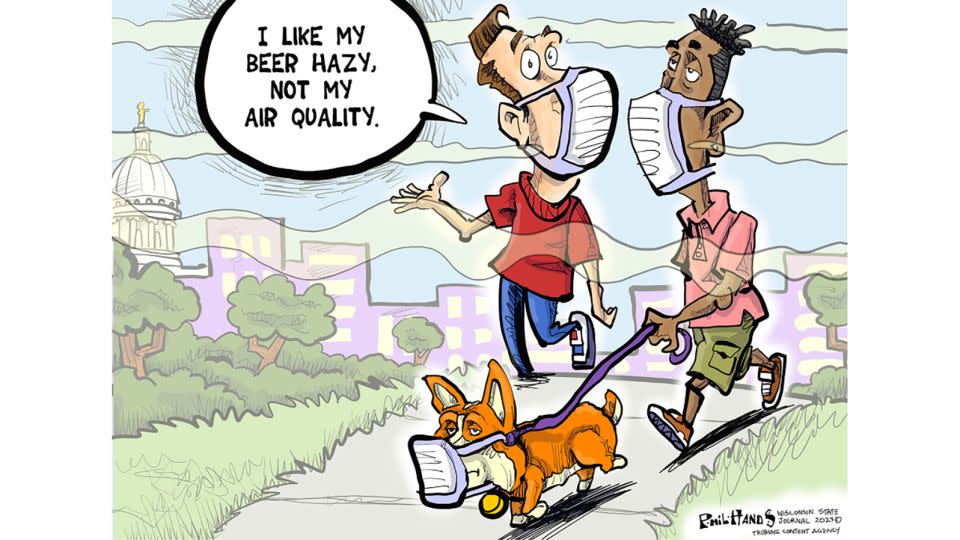
The smoke came back. “People in vast swathes of America are breathing in the smoky air from Canada’s record-breaking wildfires,” wrote Julian Zelizer. “Residents of Chicago, Detroit and other areas in the Great Lakes region woke up to poor air quality this week. They are experiencing the unsettling fog that New Yorkers lived through a few weeks ago, which was eerily reminiscent of the pandemic: Broadway shows were closed, masks were on faces and many city streets were emptied.”
It’s another wake-up call alerting us to the risks brought by climate change, which can lead to more droughts and wildfires.
It’s also “an important governing opportunity for elected officials who have struggled to build political support for bold climate change measures that would get to the root of some of these issues… Millions of Americans are feeling the painful and immediate effects of environmental degradation. For too long we have been sitting still. We can’t afford to do so any longer.”
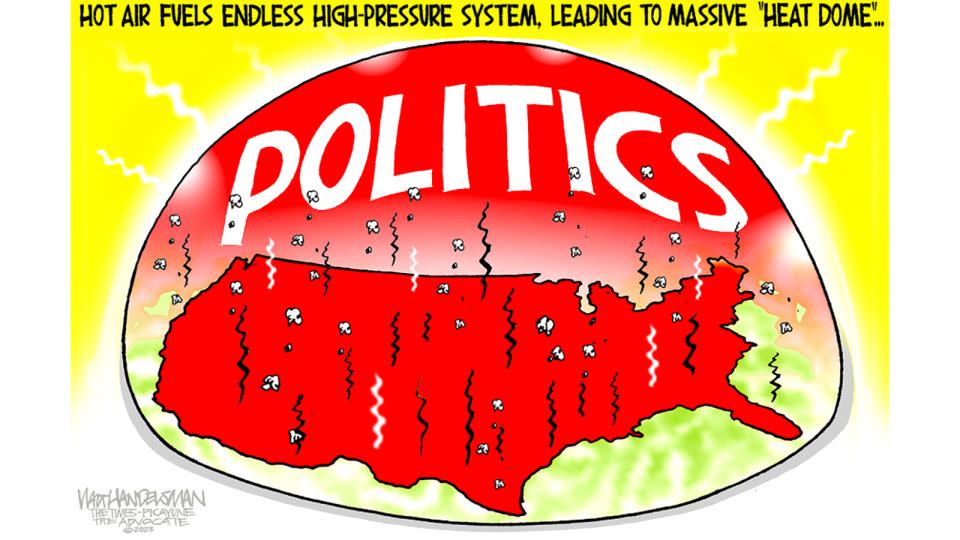
The Trump tape
The audio recording of the 2021 meeting at Trump’s Bedminster estate in New Jersey, obtained by CNN last week, is only two minutes long, but it offers insights into the case against the former president for allegedly mishandling classified documents.
Jill Filipovic wrote that Trump’s words are worth a listen: “‘These are the papers,’ he says, seemingly in an effort to demonstrate to his listening audience that, contra reporting in The New Yorker, it wasn’t his idea to attack Iran, but rather the Defense Department’s. The documents, he says, are ‘highly confidential’ and ‘as president I could have declassified it. Now I can’t, you know, but this is still a secret.’”
“In other words: The former president knew that the documents in his possession were classified and secret. He knew that, as a former president, he was not allowed to declassify them or show them to other people.”
“He seems to have shown them to others anyway – that’s certainly what the audio suggests. Or at the very least, he disclosed some of their contents, and had them in his possession – potentially illegally.”
For more:
Patrick T. Brown: DeSantis is trying to climb Trump’s wall
Duncan Hosie: If you think Trump’s Supreme Court picks were bad, take a look at DeSantis’ judgeship choices
Ken Ballen: Why a Navajo leader’s conviction gives prosecutors a road map to take on Trump

Melatonin questions
A 2018 study found that Americans were taking twice as much melatonin as they were a decade earlier. The supplement is widely used as a sleep aid, but Dr. Jennifer Martin, immediate past president of the American Academy of Sleep Medicine, wrote that there are real questions about its widespread use and concerns about side effects.
“This dramatic increase in use of melatonin reflects our inclination to try ‘shortcuts’ to get a good night’s sleep. Melatonin isn’t the first one and it surely won’t be the last.”
“There is a strong placebo effect when it comes to insomnia treatment,” Martin wrote. “Believing that melatonin will improve sleep can help people feel more relaxed when they get into bed and they stop trying so hard to fall asleep. This means the melatonin itself isn’t helping them sleep and this initial benefit typically doesn’t last over the long term.”
And “people can become psychologically dependent on taking the supplement and become afraid of what will happen to their sleep if they stop taking melatonin. This can make it extremely hard to sleep because they feel anxious if they don’t take the supplement.”
“After we discuss their specific sleep concerns, many of my patients start to realize they have been spending a lot of money on something that isn’t solving their problem.”
Mutiny aftermath
The jury is still out on how Russian President Vladimir Putin’s regime will be affected by the failed rebellion mounted by Yevgeny Prigozhin and his Wagner mercenaries.
Prigozhin was harshly critical of Russia’s rationale for invading Ukraine. His remarks might feed “the long-unspoken belief by many Russians who feared to make their voices heard that fundamentally, the war in Ukraine is not worth fighting or dying for — far from it,” noted David A. Andelman. “Now, that dirty little secret has had a full, if not yet complete, airing. And the consequences of that alone could be monumental.”
But Putin might have a stronger hold than many think. Jade McGlynn, an expert on public opinion in Russia, told CNN’s Chris Good that she doesn’t “share the assertions some are making that this is definitely the end, or the beginning of the end, of Putin. I think it’s definitely the beginning of a new phase.”
Parts of the Kremlin’s propaganda assault on its neighbor resonate with ordinary people in Russia, she wrote. “The idea that Ukraine would be doing any of this out of its own agency, rather than the West trying once again to destroy Russia just like it destroyed the Soviet Union — in that sort of revisionist version — that’s much easier to understand. That makes much more sense…to them in terms of everything, in terms of popular culture.”
For more:
Frida Ghitis: It wasn’t like this in Moscow in 1991
Keir Giles: Victory for Ukraine could be closer than we thought
Don’t miss
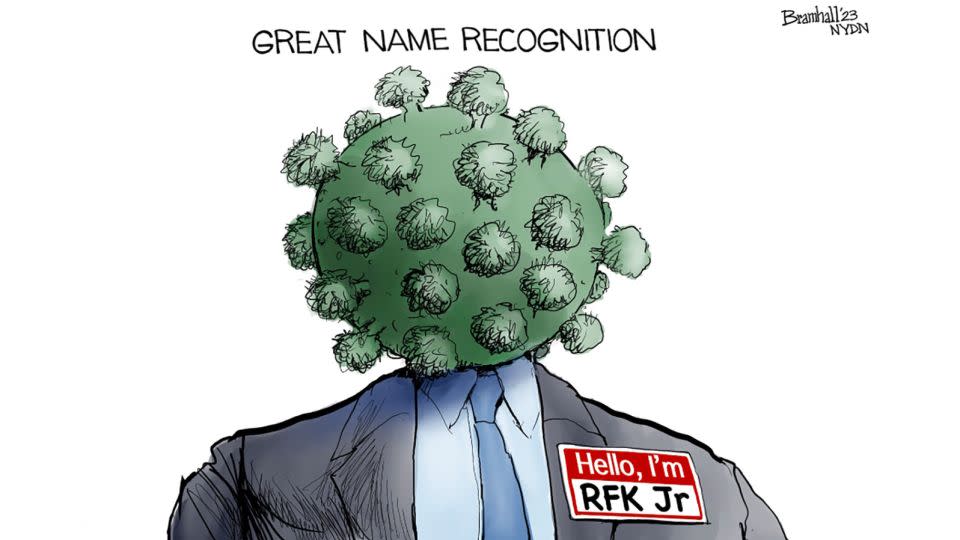
Dean Obeidallah: RFK Jr. is a Republican in disguise
Keith Magee: The myth of a colorblind France
Kara Alaimo: The book reviewers who kill books they don’t even read
Vicki Shabo: Pregnant workers get a major win. How to follow that up
Leroy Chiao: What space tourism and deep ocean travel have in common
Abdullah Shihipar: The unconscionable move many hospitals are making
Billy Lezra: Going sober taught me something about Pride
MonaLisa Leung Beckford: My childhood in Hong Kong prepared me for how China reacted to ‘The Little Mermaid’
Timothy Naftali: Why 2020 will go down as a turning point for America
AND…
‘A common purpose’
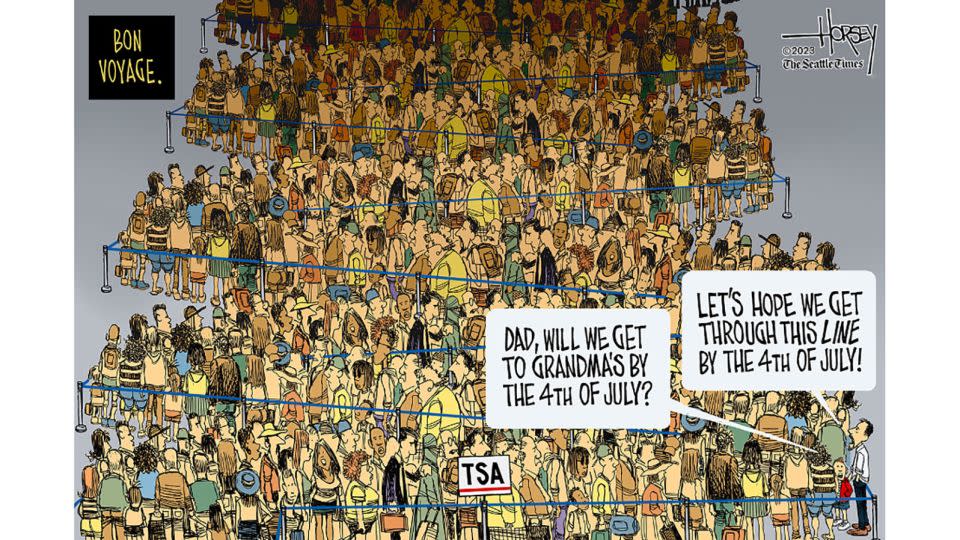
Fireworks, barbecues and travel chaos aren’t the only features of July 4th worth noting. It’s also an opportunity to salute American heroes, including the more than 3,500 recipients of the Medal of Honor, according to two members of Congress backing an effort to build a monument for them.
Reps. Blake Moore, a Utah Republican, and Marc Veasey, a Texas Democrat, noted the inspirational story of Hershel “Woody” Williams, the last surviving Medal of Honor recipient from World War II, who died last year.
Moore and Veasey wrote that “Williams earned the Medal of Honor — our nation’s highest recognition of valor in combat — for his extraordinary actions during the Battle of Iwo Jima in World War II, when he repeatedly exposed himself to enemy fire over several hours while singlehandedly destroying enemy pillboxes,” helping to prepare the way for US tanks and infantry.
After leaving the Marines, Williams led a foundation that supported veterans and their families. The congressmen recently introduced the Hershel ‘Woody’ Williams National Medal of Honor Monument Location Act, which would designate a location for the new monument on Washington’s National Mall, near the Lincoln Memorial.
It’s “a fitting tribute to President Abraham Lincoln, who established the award and embodied its principles…”
“There is no doubt that America finds itself divided today,” Moore and Veasey observed. “But just as President Lincoln worked to unify our nation, our hope is that this monument can remind all Americans that there is far more that unites us than divides us — and that we can rally behind a common purpose far greater than ourselves.”
For more CNN news and newsletters create an account at CNN.com

